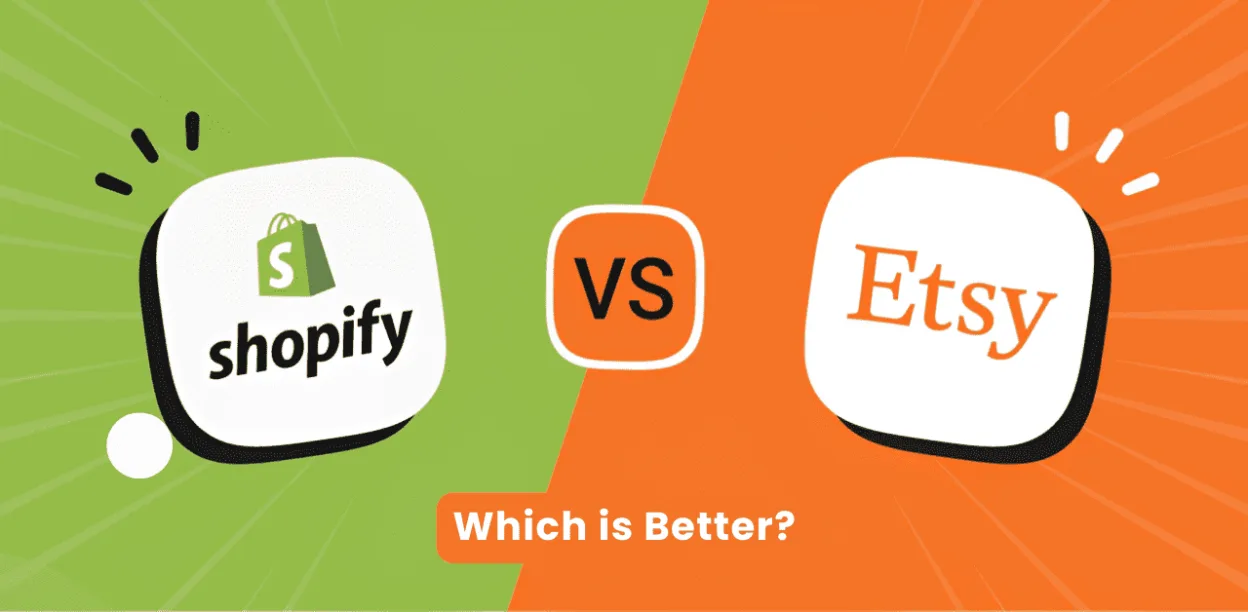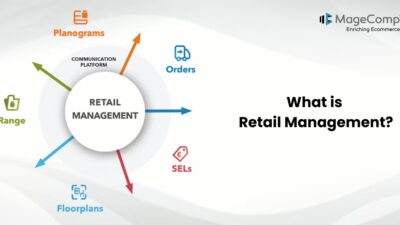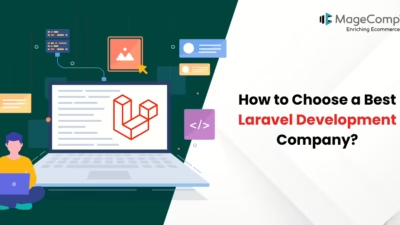Which eCommerce platform to choose to take your business online has always been the most common dilemma of every business owner. The most common eCommerce platforms that have become the talk of the town are Shopify and Etsy.
Both eCommerce solutions giants allow businesses to reach their audience worldwide, and their only aim is to help admins build thriving eCommerce businesses.
Despite sharing the same aim, these eCommerce platforms differ from each other in multiple ways. Shopify is a user-friendly tool that allows business admins to develop an attractive eCommerce store from scratch. Etsy is a platform similar to eBay; hence, merchants do not need to have any specific technical skills.
So, why compare Shopify with Etsy? Read further to learn what makes them different.
Also Read – Shopify Vs. WooCommerce
Key Difference Between Shopify and Etsy
When you’re about to launch your online sales through an e-commerce platform, it’s crucial to understand the key distinctions between them and what each one provides to support your success.
Also Read – Shopify Vs. Squarespace
Shopify is a comprehensive eCommerce platform that empowers users to create their own online store and establish their brand. It offers a wide range of industry-leading tools for site design, including customizable themes, landing page templates, apps, plugins, and other features to support e-commerce development.
With Shopify, you can easily build and customize your online store, set up your sales processes, and scale your business from the very beginning.
Etsy is a popular online marketplace that allows individual sellers to showcase and sell their unique items directly to buyers. Sellers can take advantage of Etsy’s broad customer reach, search tools, and marketplace features. However, due to the platform’s structure, they need more control over the branding and customization of their individual shop spaces.
Selling Comparison between Shopify and Etsy
Feature Points | Shopify | Etsy |
| Target Audience | Every business, ranging from small companies and startups to large businesses | Artisans, sellers of handmade products, and crafters. |
| Ownership | Business admins have full ownership, including customers’ information and store data. | Sellers have ownership of the product listings, and Etsy owns the entire marketplace. |
| Domain | Available with name registration and custom domain. | Not available |
| Mobile App | Shopify provides a mobile app that allows you to manage your eCommerce store anytime. | Etsy provides a seller app that manages product listings and orders. |
| Pricing Plans | $39, $79, or $299 for a monthly subscription.$29, $89, or $399 for annual subscription. | Free and $10 for a monthly subscription. |
| Additional Costs | When making payments online, there is a fee of 2.9% plus $0.30. For in-person payments, there is a fee of 2.6% plus $0.10. | There is a $0.20 listing fee for each item listed, a 6.5% transaction fee when a transaction occurs, and a $0.25 processing fee for each transaction. |
| Customization | Shopify offers multiple customization options with plugins, apps, and theme templates. | Etsy offers limited customization options. |
| Payment Options | It provides extensive gateway options, including Shopify Payments, PayPal, and more. | Provides Etsy payments and other payment options that vary from country to country. |
| Point of Sale | Provides POS for in-person sales. | It does not provide a POS |
| Worldwide Selling | Supports worldwide selling with multiple currencies, languages, and tax settings | Etsy supports worldwide shipping with multiple currencies and languages. |
| Shipping Discounts | It provides discounts of up to 77% for basic plan users and 88% and more for advanced plan users. | Provides shipping discounts of up to 30%. |
| Customer Base | Business admins need to generate traffic for their store. | Etsy marketplace has its own in-built traffic. |
| Return Policies | Business owners have the authority to create their own return policies. | Etsy has its own guidelines, and sellers can create return policies based on them. |
| SEO and Marketing Tools | Shopify provides advanced marketing and SEO tools, including email marketing and much more. | Etsy provides basic marketing tools. |
| Content marketing (blog) | Shopify has an in-built blogging platform for content marketing. | Etsy does not have any content marketing tools. |
| Analytics | It provides extensive reporting and analytical tools. | It provides basic analytical tools. |
| Customer Support | It provides 24/7 customer support via email, call, and chat. | It provides basic customer support. |
| Abandoned Cart Recovery | It is provided only to high-tier plan users. | It is not provided by Etsy. |
| Third party integrations | Shopify has a huge store for third-party plugins and apps. | Etsy has limited integrations and external services. |
| Dropshipping | Shopify supports dropshipping from apps like Oberlo | Etsy does not support dropshipping directly. |
| Wholesale Selling | It is available through Shopify. | Etsy has limited options with wholesale selling. |
Shopify Vs. Etsy
1. Pricing Plans
Before moving any further, learning the cost of the respective eCommerce platform can help admins evaluate the cost of running a business via that particular platform.
Plans | Monthly Pricing | Annual Pricing |
Basic Plan | $39 | $29 |
Shopify Plan | $89 | $79 |
Advanced Plan | $399 | $299 |
- Transaction Fees
Plans | Credit Card Rates | In-Person Rates |
Basic Plan | 2.9% + $0.30 | 2.7% |
Shopify Plan | 2.6% + $0.30 | 2.5% |
Advanced Plan | 2.4% + $0.30 | 2.4% |
- If merchants are not using Shopify Payments, they must pay an additional fee of 2% for the Basic Plan, 1% for the Shopify Plan, or 0.5% for the Advanced Plan. These fees are charged per transaction for external payment gateways.
Etsy Pricing
- Listing Fees – Each item listed incurs a $0.20 fee, which is renewed every four months or when the item sells.
- Transaction Fees – Etsy charges a transaction fee of 6.5% of the total sale price, including shipping.
- Payment Processing Fees – In the U.S., there is a 3% + $0.25 fee per transaction, with variations in other countries.
- Offsite Ads Fee – If your sales in the past 12 months are under $10,000, a 3% fee is applied; if you exceed $10,000 in sales, the fee increases to 12%.
- Subscription – Etsy Plus, priced at $10 per month, offers additional customization options and credits for listings and ads.
When comparing Etsy and Shopify’s fee structures, it’s important to consider the potential impact on your business. Etsy has a simpler fee structure, but costs can add up with multiple listings and high transaction volumes, especially when factoring in offsite ad fees.
On the other hand, Shopify’s fee structure includes a higher upfront cost with its subscription plans, but it offers more comprehensive features and lower transaction fees through Shopify Payments.
The decision between the two platforms depends on your business model, sales volume, and your preference for platform features versus cost predictability.
2. Website Builder
The website setup process for Etsy is quick and straightforward. New users are guided through a few simple steps, such as naming their brand, providing details for each item they want to sell, and explaining shipping and returns information. However, the integrations available for more convenient product management are limited.
Shopify is an eCommerce platform that offers both self-help and pro-help options for creating online stores. While it provides guidance for setting up a store, leveraging its full customization and optimization capabilities may require expert assistance.
The platform also allows seamless integrations with various PIMs (Product Information Management), ERPs, and other business platforms, making it a powerful tool for building online businesses.
3. Website Designing and Customisation
Etsy’s product presentation options are limited to its standard generic frameworks, without support for templates, apps, or plugins to customize sales spaces. As a seller, you have minimal opportunity to enhance the presentation appeal of your items to shoppers.
However, there are more aesthetically competitive Pattern designs available for a monthly cost of $15.
On the other hand, Shopify offers a wide range of polished professional e-store design templates, both free and paid, as well as numerous feature-rich apps and extensions to enhance store functionality and personalize its aesthetic to match your brand.
4. Payment and Data Security
Etsy and Shopify both prioritize the security of customer payment transactions. Etsy holds an SSL certificate, ensuring that sensitive payment information is encrypted and protected during transmission. However, more information about specific security protocols and measures is needed.
Shopify not only holds SSL certificates for secure data encryption but also employs intensive security system monitoring, two-step authentication, and fraud detection systems, along with compliance with PCI DSS, enhancing the protection of sensitive information.
5. Payment Options
Etsy Payments provides sellers with the ability to accept a variety of payment methods, such as credit/debit cards, PayPal, and Apple Pay, based on their location. Although regional availability may limit options, Etsy is continuously expanding its reach.
Shopify offers broad support for payment gateways globally. In addition to Shopify Payments, which streamlines the payment process and reduces transaction fees, Shopify also accommodates PayPal, Stripe, and numerous other third-party payment processors. This level of flexibility empowers merchants to select the most suitable payment options for their business and customers.
6. Point of Sale
Shopify POS is an all-encompassing solution designed for merchants who operate both online and brick-and-mortar stores. It seamlessly integrates online and offline sales, streamlines inventory management, and facilitates in-person payments.
The system accommodates various payment methods and offers hardware options to establish a comprehensive retail setup, making it an ideal choice for businesses seeking to synchronize their sales channels.
As discussed above, Etsy does not provide a dedicated POS system. As a result, sellers participating in craft fairs or pop-up shops have to resort to third-party solutions for managing in-person sales. This can lead to disjointed inventory management and inconsistent sales tracking.
7. International Selling
When it comes to international selling, Etsy and Shopify provide different features and tools to support sellers. Etsy allows sellers to list items in multiple languages and accept various currencies, with automatic translation and currency conversion for buyers.
However, tax settings and compliance with international shipping regulations depend on the seller.
Shopify offers comprehensive tools for international selling, including multilingual stores, multiple currency acceptance, and regional tax settings. Shopify also provides guidance on international shipping and compliance, making it easier for merchants to expand globally.
8. Shipping Discounts
Etsy and Shopify both offer shipping discounts to their users. Etsy’s shipping discounts can go up to 30%, but the actual discount depends on factors such as shipping volume and carrier agreements.
Sellers can enjoy reduced shipping costs for their buyers through Etsy’s partnerships with shipping carriers.
Shopify provides even more substantial shipping discounts, especially for users on higher-tier plans. Basic plan users can receive up to 77% off, while advanced plan users can save up to 88%. Shopify partners with major carriers like USPS, UPS, and DHL to provide these discounts, which can be particularly helpful for high-volume sellers.
9. Customer Support
Etsy offers customer support through its Help Center, email support, and community forums. While phone and live chat support are available during specific hours, there might be better options for urgent situations.
Shopify provides round-the-clock customer support through phone, chat, and email, ensuring that users can receive immediate assistance at any time. This level of support is particularly beneficial for addressing technical issues promptly and maintaining an online store’s seamless operation.
10. Abandoned Cart Recovery
Shopify’s higher-tier plans come with a valuable feature known as abandoned cart recovery. This feature enables merchants to automatically send follow-up emails to customers who have added items to their shopping cart but still need to complete their purchase. In addition, Shopify has a huge app store from which admins can easily install third-party Shopify apps into their store and enhance their store functionality.
These emails and messages can include incentives like discounts or gentle reminders to prompt customers to finalize their purchases. This capability proves effective in recovering lost sales and enhancing conversion rates. It’s a particularly valuable tool for boosting revenue without increasing marketing expenses.
Check out this Shopify app – KOOL WhatsApp Notifications
Etsy does not provide an abandoned cart recovery feature. As a result, sellers on Etsy have to resort to alternative methods for cart recovery, such as manual follow-ups or utilizing external email marketing services, to reconnect with potential customers who have abandoned their carts.
11. Third-Party Integrations
Etsy has limited integrations with external services, mainly focusing on tools that enhance listing, shipping, and marketing functions. While this is adequate for many small businesses, more complex operations may be needed.
Shopify offers an extensive app marketplace with thousands of third-party integrations covering a wide range of functionalities, including marketing, sales, customer service, and inventory management. This choice of integrations, such as Shopify x Instagram, Facebook, TikTok, etc., allows businesses to customize their stores and scale their operations.
12. Dropshipping
Etsy does not provide direct support for dropshipping. The platform’s sellers typically handle the creation and shipping of their products, emphasizing handmade or unique items.
Individuals interested in dropshipping would have to seek out external platforms or methods to incorporate this business model with their Etsy shop, which can be pretty intricate and burdensome.
Shopify offers robust support for dropshipping through a variety of dropshipping apps. These apps empower merchants to seamlessly add products from suppliers directly to their stores without the need to maintain inventory. This streamlined approach makes it simpler for Shopify users to launch a business with minimal initial investment and effectively manage their operations.
13. Wholesale Options
Etsy has some options for bulk sales, such as creating bulk listings and offering discounts for larger orders. However, specialized tools are needed to manage wholesale relationships or pricing.
Shopify provides a wide range of apps and features to support wholesale businesses. Merchants can create password-protected wholesale sections, offer tiered pricing, and effectively manage bulk orders. These capabilities make Shopify a versatile platform for businesses aiming to serve both retail and wholesale customers.
Which is Right for Your Business?
Both Etsy and Shopify are top performers in the world of e-commerce, each excelling in their unique ways.
Etsy is a thriving digital marketplace that caters to small-scale sellers. It offers a specialized inventory of handmade and creative products, and sellers can easily showcase their products to a large audience of eager shoppers.
Shopify is an ideal choice for entrepreneurs looking to establish and expand their online businesses. It provides a robust platform for creating customized digital stores and allows full control over operations and design.
Unlike Etsy, Shopify empowers sellers to build independent brands and take their customer base with them if they choose to transition away from the platform.
If you want to launch a Shopify store, hire our Shopify experts and get an eCommerce store tailored to your business needs.








